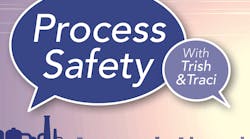This episode of Process Safety With Trish & Traci details tips and tactics to better lead during trying times -- whether it’s a global pandemic or just a time of critical importance. Spoiler: Self-care is important as is a sense of fun.
Transcript
Traci: Welcome to this edition of "Process Safety with Trish & Traci," the podcast that aims to share insights from current incidents to help avoid future events. I'm Traci Purdum, Senior Digital Editor with Chemical Processing, and, as always, I'm joined by Trish Kerin, the Director of the IChemE Safety Centre. Trish, how are you doing today?
Trish: I'm doing well. Thanks, Traci. How are you doing?
No worries! Subscribe and listen whenever, wherever.
Traci: You know, it's sunny out and about 60 degrees here in Cleveland so I was outside weeding and getting my vitamin D in, so I feel pretty good. But, obviously, today's topic, we're going to talk a little bit about the atmosphere that we're in as a country, as the world. So, 60 degrees and sunny, and doing gardening is wonderful.
Today's topic has been on the mind of just about everyone in the world: How to manage in uncertain times, whether that's managing your workforce or managing your workload without knowing what's in store next week or even next month, and, in some instances, doing it from a remote location. There are multiple scenarios that could apply to this, but, obviously, the elephant in the room here is the COVID-19 pandemic. You recently released a short book on leadership called "Let's Talk about Your Leadership: Learning through the art of storytelling." I'm guessing you weren't thinking at the time that this could come in quite handy with our current events.
Trish: No, I certainly wasn't. It was released in a very different time for the world. And I think it maybe does have some really useful hints for people in what direction to go because the fact is that we are all in a very uncertain situation at the moment and we're all in this together. And I will be completely upfront and honest, I don't have the answers. I don't think any of us do. We're just doing our best to get by at the moment, and that's what we need to do. And so, hopefully, you might find some useful tips throughout this podcast and also, potentially, in the book as well.
Traci: Indeed. And the first question I want to ask -- is being a leader during times of uncertainty any different than being a leader during normal operations?
Trish: Fundamentally, I don't think it actually is. I just think we are more desperate to see it during a difficult situation because we have a desire to be led. We really need to be taken on a journey that needs to be taken. And so I don't think it's any more important to do it. I don't think you can get away without doing it at other times, but the issue is we don't seem to... We seem to really notice when we're not getting good leadership at the moment, and I think that makes it all the more visible to us, and I think that's the challenge.
And I think, for me, it's really important to understand what leadership is about, and there's many different definitions of it. For me, my personal definition is to enable people to be their best and get where they need to be. It's all about taking the team where the team needs to be, and there are certain things that you need to be able to do that. So if I think about who we are as people, and I think that's an important basis for leadership, there are six different things that I think are really important around who you are.
You need to be inspirational for people. You need to have vision, you need to be trustworthy, you need to serve others. And that's one we often forget in leadership, that leadership is actually an act of service, not the other way around. We need to be empathetic. And for me, that's quite an interesting one because empathy was not always strong with me. I actually had to really learn to understand it and to recognize it because it didn't come naturally to me, but we can learn these things as well. And I think we need to be humble. We need to be able to admit we might've got something wrong. And I think that's a really important part about who we are as a person, and that shapes who we are as leaders.
But then we actually have to behaviorize those in some way. You have to take actions, and so I think that comes down to what we do. And we need to be able to clearly set a direction for people and we need to be able to articulate what that direction is. They need to know where we're trying to go. It's really difficult at the moment because the world is so uncertain. You really need to be yourself, because authenticity, it's so underrated in how important it is. People can always detect when someone's not being themselves or being fake, and you're far more likely to get a good response from someone if you're authentic with them.
We need to be consistent so we're not leaving people guessing about what's going on. We need to speak up, and, sometimes, this is really difficult because we have to speak up. And it could have ramifications against us, against our careers or, potentially, against relationships if we don't speak up and say the right thing when it needs to be said. Obviously, we need to look after people. People are what this is all about. That's what we have leadership for, it's for the followership. And if we don't have people following us, then we're actually not really leaders.
The next one I think, for me, is quite an interesting one. It's also often forgotten, but we actually need to have fun in some of this stuff. And I'm seeing a lot of that happen at the moment with companies doing funny hat days, and sharing photos, and sharing photos with your four-legged co-workers from home and all these sorts of things. It's actually really important to take a moment and have fun.
We need to seek out information and be willing to admit we don't know every answer, that we don't know most of the answers. We've got to ask the questions, we got to look for the information. And then, lastly, we need to take a moment to reflect. We have to actually know what went well and what we can do better next time. So the reflection part of it is quite important as well.
And I think when you tie that all together, that really brings together what leadership needs to be at all times. But at this particular point in time, it appears to be so much more important to us because we really need that leadership so that we've got some sense of normality in our lives.
Traci: Now, you had mentioned several different times here making sure that people know where you're coming from. And I guess this comes to the point of how important is communication, taking all of those, who leaders are and what they do, but you need to communicate that to folks. So how do you do that effectively, especially when you're in a non-traditional setting?
Trish: Yes, communication really underpins all of this. If you can't communicate as a leader, then it doesn't really matter what else you do because no one's going to get the message clearly. It's going to leave people confused. And, you know, we need to remember that communication is actually about sharing. It's to share the message, and that implies that it's actually two-way. I share something with you, you share something with me. So we really need to make sure we do keep that sharing concept of communication and make sure that we are...as far as we can, we need to be transparent, we need to be consistent, and we need to be truthful in that communication.
And some of the challenges we have is that, we often go off non-verbal cues from people and informal type communication, but we don't necessarily have that right now. We're now left with phone calls and emails. We do get visual cues on video conferencing but it's still not quite the same as if we were sitting face-to-face with the person. So, communication has actually changed a little bit in what we do, and we need to strive and work a bit harder at it.
And there are some key tips around how you need to communicate. First of all, you need to remember that if I've got a message to share with you, first of all, I'm going to have some ingrained biases that are going to influence that message. And then I'm going to package that message some way with those biases and I'm going to hand it over to you, but you're going to have some ingrained biases as well in all of that. So the message you hear might be quite different to the message I send because we've also got all these external noise around us that impacts the communication process, too. And so communication needs to be a feedback loop so we can both get to the point of both understanding what the key message was. And that's why we should seek to clarify what the message was from someone to make sure we really understand.
And, again, to be able to have those sorts of communications, we need to have empathy at the core of it. We need to be willing to understand where the other person is and what's going on for them because that helps us to unravel some of the biases as well. So, you know, what are you trying to communicate? You need to understand what the point is, first of all. You need to try and meet the audience's needs. What do they want to hear from you? Try and avoid technical language if you can. That can only confuse people at this point.
I find storytelling really, really helpful. Humans love storytelling, we respond to it very well. It's how we learn a lot. And so when we break down the story into small little chunks and we can clearly show cause and effect as we're going through the story, it can actually really enhance the person's ability to not only absorb that information but to take it on as a learning and keep it in there. But the key is we need to be courageous enough to admit that we might not know something. We might be asked a question that we don't have an answer to, and as a leader, the courageous thing to do is to say, "I don't know right now but I'll find out for you," or, "Let's work on that together." It takes courage to do but it's really, really important because we need to be transparent and we don't know the answers to everything, so I think that's a really key part.
Traci: Exactly. Being courageous and saying that you don't know the answer, being transparent, being truthful all help with the trust issues. But how do you truly ensure trust in turbulent times?
Trish: Trust takes time to build, and we can't just flick a switch and get trust immediately. That's the challenge. So we've had environments of low trust leading into this. We've got low trust and that's going to be a problem. What we need to do is try and build that trust, regardless of whether you're starting from a low or starting from a high on it.
And there's actually four key elements of trust that are critical. One is sincerity. So, does what I say match what I do? Can you trust that I'm going to walk the talk for you? The next one is competence. Am I actually capable of doing what I claim I can do? Then we've got the liability. How well have I delivered in the past? And, lastly, involvement. Am I actually interested in your needs at all? And if any one of these four are missing, it will undermine the trust. We actually need all four of them to be there, and we need to remember that trust is also situational.
So there are certain people that are competent in certain things. So I trust my partner to drive me places but I don't trust them to fly me in a plane because they're not competent as a pilot. And so, trust is situational. We need to remember that as well. So, what situation are we in? We're not capable of doing everything, so we can't expect people to trust us to do everything because we're not competent in that space. So that becomes quite an important part, too, I think.
Traci: And illustrating your storytelling abilities with the car driving and the airplane clicks. The light bulb goes on right when you say that, and that's the importance of the storytelling.
Trish: Absolutely.
Traci: Sometimes, a crisis shines the light on true leaders, those who step up and take control. Obviously, we see it in every situation. A true leader really rises us to the top. Can you learn to be assertive and in control?
Trish: I think you absolutely can, and there are some useful resources out there. There's actually one called "Decision Making During A Crisis: A Practical Guide," and it was released by the Australian Government back in 2018 by the resilience part of the government. And it actually has six key steps to follow to make decisions in a crisis, basically, and all of these can be learned. There's nothing new or difficult in here, it just takes effort and application. And the first one is that we need to confirm authority and direction, who is in charge and where are we going?
Now, if you've got a normally consultative or collaborative leadership style, you may need to adjust it in a crisis because we don't necessarily have the time to be collaborating and consulting with everybody. Sometimes, we need command and control because we need to be making urgent decisions at the time. And, perhaps, command and control is better suited to a crisis where we need to respond quite rapidly to changing information. But, very clearly, who's in charge and where are they trying to take us? That is the first one.
The next element is to establish psychological safety. And this is important because the leadership team that are supporting the leader actually need to be able to voice their concerns and raise their issues. It needs to be safe for them to do so. It's not about trying to achieve a consensus, it's actually about the respectful challenge. So we need to make sure that people get information and the team is able to provide that input. So, asking questions and trying to get as much data as possible is a really positive thing, but people need to feel safe to challenge and to ask those questions.
The third one is to understand that we're going to be using explicit and tacit knowledge. So, explicit knowledge can be easily identified because it's very clear to define. Tacit knowledge is more based on our experience, our insights, our intuition. It's a bit harder to identify, but we have knowledge and experience that we bring to the table. We need to be willing to explore both sides with not only our knowledge but also our experience of what's there.
The next one is to manage expectations, and this is really important. People want to know what to expect, and we don't always necessarily have the answers, but we need to be able to set up expectations in some way. And there will be external expectations and internal expectations as well. So, external might be, and I'm sure we've all been receiving them, "Such-and-such hotel cares about your safety. Here is how we're tackling the COVID-19 crisis," and we're getting swamped by emails like that. Everybody is telling us how they're dealing with the crisis. And, in most instances, as the general public, we really don't care because it doesn't impact us, and I think people are getting quite sick of all those emails coming out. But that's an example of the organization managing its external expectations. They are doing it on their own. What we're seeing as the customers is multiple emails come through, which is getting a little bit frustrating. But they're doing the right thing from their perspective of managing their external expectations.
Internally, our employees need different information and they need it in different time frames, potentially. It's important to make sure that we set the expectations in terms of...it might be every Tuesday at 2 p.m., we will hold a briefing and tell you the latest of what's going on. It might be every day we're going to hold a briefing because there's so much changing information. So, for example, in New Zealand, the New Zealand Prime Minister is speaking to the country and answering questions every day, I think, at 12 p.m. That's it, every day at 12 p.m., PM Jacinda Ardern is online and talking to the country. She set that expectation and she's meeting that expectation, so it's a really clear, "I'm going to be here, I'm going to talk to you. I'm going to be authentic, I'm going to tell you the truth. If I don't know, I'll tell you I don't know." But she's managing the expectations of her people because she's taken her country into a very significant lockdown for a period of four weeks.
The next one is managing cognitive bias. And this is challenging because, first of all, you have to recognize that there's bias in there. And there's usually three that really impact in decision-making. So, there's anchoring where I'm stuck on only one key piece of information and that's all I care about, I'm not saying anything else. Confirmation bias, I'm only looking for data that confirms what I suspect or what I think anyway. Or, overconfidence bias, "I've got this. I don't need any help. I know what I'm doing. I'm the best at this." So we need to be able to deal with those biases. A simple way to do it is to pick a team member to challenge their biases every time they see it. So, a little bit similar to [Dr. Edward] de Bono's six hats with the Black Hat, the devil's advocate, someone to challenge us is quite important as well.
And then the last part is you actually need to record the decisions that were made because, basically, if it's not written down, it never happened. So, record the information but also record it in a way that people can access if they need to. They can see the information, they can challenge it, and they can see where we've come from and where we're going and continue to plot the course. So it's really important to have all of that information documented quite clearly. And those six areas, they're all things that can be learned. They're all actionable, we just need to have the discipline to actually go through and take those steps as we go through that process.
Traci: There are a lot of steps to take and there's a lot of moving parts. And what I'm getting at is there's a lot of heaviness taking its toll on these leaders during these uncertain times. Any advice on how to keep going, how to make sure that you're not going to burn out leading your company, leading your team to where they need to go?
Trish: Yeah. And look, that's a really important part of this. At the end of the day, as a leader, we actually also need to take care of ourselves because no one else is taking care of the leader. The leader is going to have to do that themselves. And it's not selfish to look after yourself because if you don't take care of yourself, you won't be there to take care of anybody else, so it's really important that you do take that time. So, practical things, like you need to schedule some exercise time to make sure that you keep moving, you keep healthy, you get some fresh air.
Create a routine. If we're all working from home, we actually need to still get up every day, have a shower, get dressed, have breakfast, and then physically go to work, whether that is just walking up to the dining table where your computer is set up or if you've got a home office, open the door and go into your home office. You actually need to have an act of going to work. You need a routine.
You then need to make sure you take regular breaks, especially from screen time. There is only so many hours a day you can do online in meetings with people before your eyes will start to strain, your brain will start to strain, so you need to take those regular breaks. Take a lunch break. If you're allowed, go for a walk outside if the weather's okay. Get out in the garden and do some weeding. Those are the things that are really important because we still need our vitamin D to get through this.
And try and connect with others, whether it's a quick little instant message to other people in the office or the company, or whether it's a scheduled catch-up. I know of some groups that every day, they're doing the quiz that they would normally do together as a group in the office. They're going into a video conference at a certain time every day with a cup of coffee and doing a quiz.
Catch up with friends and family on video conferencing. I have a couple of evening dinners scheduled with friends every week, and every week, we sit down with our dinner in front of us and they sit down with their dinner in front of them, and we have dinner together and have conversation over dinner. This coming weekend, we're actually gonna be playing some games. We're gonna be playing a little bit of Yahtzee, a little bit of Trivial Pursuit all over video conferencing because that's what we normally do. And we need to make sure we continue to keep that connection with people because whilst we've been asked to socially distance, that doesn't mean we need to shut ourselves away emotionally from everything else that's happening around us. We need to take care of ourselves and for that we need the human interaction. If where we can get is through video conferencing, then that's just what we're going to have to live with at the moment so that we can keep everybody safe as much as we can and protect our health systems at this point in time.
As a leader, you also need to make sure you check in with your team. You need to touch base with them, see how they're doing, ask them if they're okay, do they feel safe. If not, you need to address that and have a conversation with them. And Graeme Cowan has got some great tips in this area on his website, and there is some really useful stuff that he's been publishing lately, so it's well worth a look there. Talk to your teams about, what did they get done yesterday. What have you succeeded in? What are you planning to do today and is there anything I can do to help you get through that? Do you have any roadblocks? How can we make that happen?
Give people a sense of achievement. One of the things I do with my team every week and I've now adopted doing with a separate office team that I work in the same office with but they're not actually part of my team is every week we share our wins for the week email. I learnt this from a guy I worked with years ago. So we start an email chain, "Here's what I did this week. Here's what I achieved. And here's a fun thing I'm looking forward to on the weekend." And just one person sends the email, and then everybody else just forwards the email with their responses to it. So, at the end, we've got a lovely email chain of everybody having to think about something they did that they achieved and something to look forward to. And it has a couple of jokes here about, "Oh, I wish I was doing that. That sounds like fun." It just gets some camaraderie even on email, and those sorts of things are just so important at this point in time, is we need to remain connected with people.
Traci: Well, I know I was getting excited about playing Trivial Pursuit via video conference or having dinner, so I was madly taking notes of all the fun things you're doing. So I can see how that really snowballs and makes everybody involved and want to showcase their wins for the week and the fun stuff they're doing, so that's great advice. Is there anything else you'd like to add?
Trish: I think we need to just remember that our leaders are only human. They're just like us and they will make mistakes. They're not perfect. We're probably harsh to judge them at times, but we just need to give them a chance. I think we all need to, at this particular point in time, show a little less judgment and a little bit more compassion for people because we're all in this together and we need to come through this together.
Traci: For sure. Well, unfortunate events happen all over the world and we will be here to discuss and learn from them. On behalf of Trish, I'm Traci, and this is "Process Safety with Trish & Traci."
Trish: Stay safe.
Check out all the episodes of Process Safety With Trish & Traci.
Want to be the first to know? Subscribe and listen to Process Safety With Trish & Traci on these platforms








